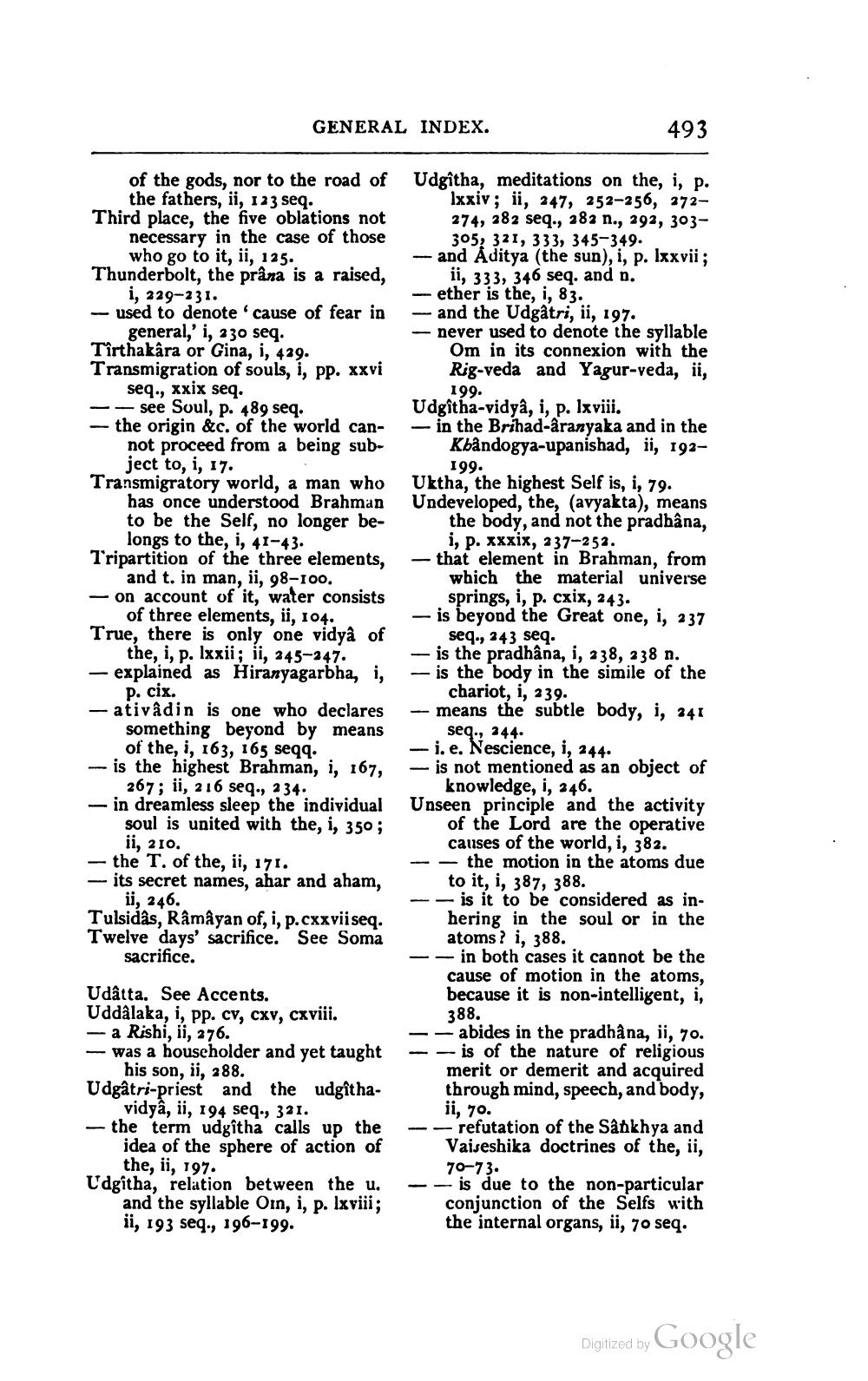________________
GENERAL INDEX.
493
of the gods, nor to the road of
the fathers, ii, 123 seq. Third place, the five oblations not
necessary in the case of those
who go to it, ii, 125. Thunderbolt, the prâna is a raised,
i, 229-231. - used to denotecause of fear in
general,' i, 230 seq. Tirthakâra or Gina, i, 429. Transmigration of souls, i, pp. xxvi
seq., xxix seq. -- see Soul, p. 489 seq. - the origin &c. of the world can-
not proceed from a being sub-
ject to, i, 17. Transmigratory world, a man who
has once understood Brahman to be the Self, no longer be
longs to the, i, 41-43. T'ripartition of the three elements,
and t. in man, ii, 98-100. - on account of it, water consists
of three elements, ii, 104 True, there is only one vidyâ of
the, i, p. lxxii; ii, 245-247. - explained as Hiranyagarbha, i,
p. cix. - ativadin is one who declares
something beyond by means
of the, i, 163, 165 seqq. - is the highest Brahman, i, 167,
267; ii, 216 seq., 234. - in dreamless sleep the individual
soul is united with the, i, 350;
ii, 210. - the T. of the, ii, 171. - its secret names, ahar and aham,
ii, 246. Tulsidas, Râmâyan of, i, p.cxxvii seq. Twelve days' sacrifice. See Soma
sacrifice.
Udgîtha, meditations on the, i, p.
1xxiv; ii, 247, 252-256, 272– 274, 282 seq., 282 n., 292, 303
305, 321, 333, 345-349. - and Aditya (the sun), i, p. lxxvii;
ii, 333, 346 seq. and n. -ether is the, i, 83. - and the Udgâtri, ii, 197. - never used to denote the syllable
Om in its connexion with the Rig-veda and Yagur-veda, ii,
199. Udgitha-vidyâ, i, p. Ixviii. - in the Brihad-aranyaka and in the
Kbàndogya-upanishad, ii, 192
199. Uktha, the highest Self is, i, 79. Undeveloped, the, (avyakta), means
the body, and not the pradhana,
i, p. xxxix, 237-252. – that element in Brahman, from
which the material universe
springs, i, p. cxix, 243. - is beyond the Great one, i, 237
seq., 243 seq. - is the pradhana, i, 238, 238 n. - is the body in the simile of the
chariot, i, 239. - means the subtle body, i, 241
seq., 244. - i.e. Nescience, i, 244. - is not mentioned as an object of
knowledge, i, 246. Unseen principle and the activity
of the Lord are the operative
causes of the world, i, 382. - - the motion in the atoms due
to it, i, 387, 388. - is it to be considered as inhering in the soul or in the atoms? i, 388. - in both cases it cannot be the cause of motion in the atoms, because it is non-intelligent, i, 388. - abides in the pradhana, ii, 70. - is of the nature of religious merit or demerit and acquired through mind, speech, and body, ii, 70. - refutation of the Sankhya and Vaiseshika doctrines of the, ii,
70-73. -- is due to the non-particular
conjunction of the Selfs with the internal organs, ii, 70 seq.
Udâtta. See Accents. Uddâlaka, i, pp. cv, cxv, cxviii. - a Rishi, ii, 276. - was a householder and yet taught
his son, ii, 288. Udgâtri-priest and the udgîtha
vidyâ, ii, 194 seq., 331. - the term udgîtha calls up the
idea of the sphere of action of
the, ii, 197. Udgitha, relation between the u.
and the syllable Oin, i, p. Ixviii; ii, 193 seq., 196-199.
Digitized by
Digized by Google




